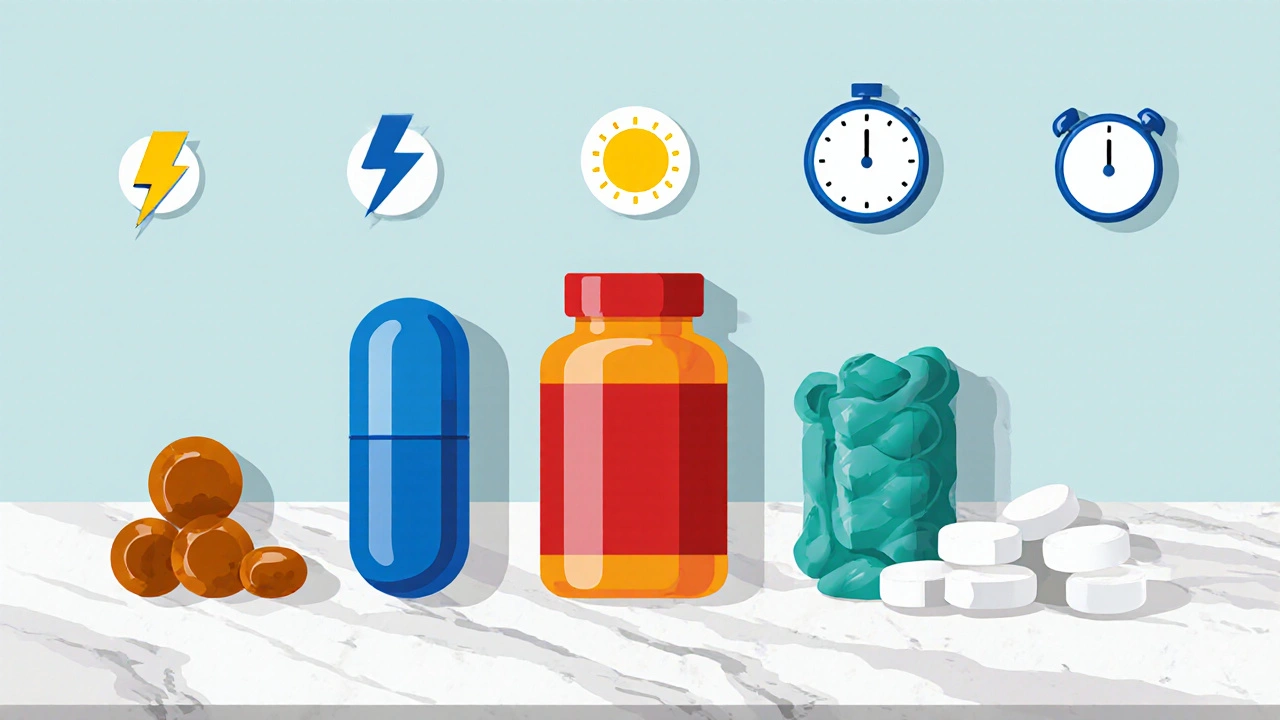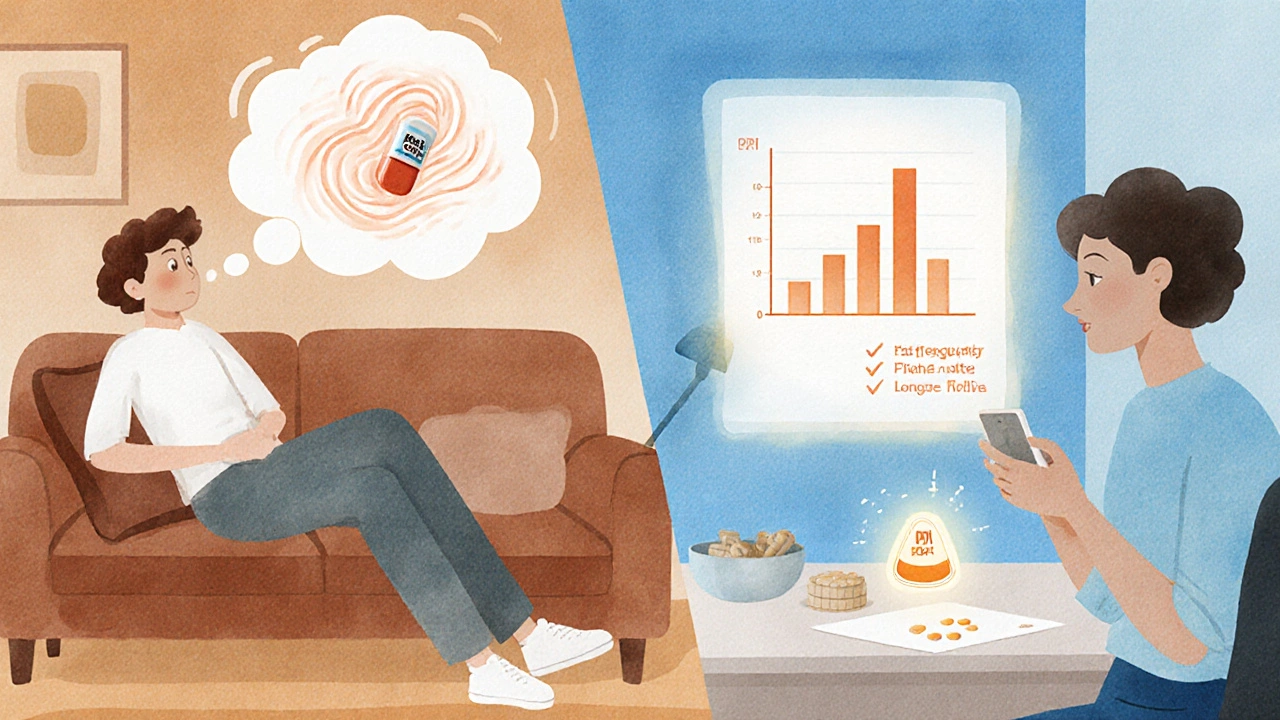
Heartburn Relief Selector
Recommended Treatment
Select your preferences above and click "Find Best Option" to get personalized recommendations.
Medication Comparison
| Medication | Class | Onset | Duration | Cost |
|---|---|---|---|---|
| Pepcid | H2-blocker | 30-60 min | 8-12 hrs | £3.50 (12-tablet pack) |
| Cimetidine | H2-blocker | 45-90 min | 6-10 hrs | £2.20 (30-tablet pack) |
| Omeprazole | Proton-pump inhibitor | 1-2 hrs | 24-48 hrs | £4.80 (28-capsule pack) |
| Esomeprazole | Proton-pump inhibitor | 1-2 hrs | 24-48 hrs | £5.20 (28-capsule pack) |
| Antacids | Neutralizer | 5-10 min | 30-60 min | £1.80 (100-tablet pack) |
When a burning feeling climbs up your throat after a heavy dinner, you want relief fast and safe. Pepcid (Famotidine) is an H2‑blocker that lowers stomach acid by targeting histamine receptors. It’s been on pharmacy shelves for decades, but you might wonder whether it truly tops the list or if another drug fits your lifestyle better. This guide walks you through how Pepcid stacks up against the most common alternatives - from older H2‑blockers to modern proton‑pump inhibitors (PPIs) and simple antacids - so you can pick the option that matches your symptoms, budget, and health goals.
Quick Takeaways
- Pepcid works within 30‑60 minutes and lasts up to 12hours, making it ideal for occasional flare‑ups.
- Older H2‑blockers like Ranitidine are now largely withdrawn, but Cimetidine remains a cheaper, less selective option with more drug‑interaction risk.
- Proton‑pump inhibitors such as Omeprazole and Esomeprazole deliver stronger, longer‑lasting relief but need a few days to reach full effect.
- Antacids (e.g., calcium carbonate tablets) act instantly but only neutralize acid temporarily; they’re best for mild, post‑meal symptoms.
- Cost, side‑effect profile, and how quickly you need relief are the three pillars to decide which option suits you.
How Pepcid (Famotidine) Works
Famotidine belongs to the H2‑blocker class, which means it competes with histamine for binding to H2 receptors on the parietal cells of the stomach. By blocking these receptors, the drug reduces the amount of acid secreted into the gastric lumen. The result is a lower overall acidity level, which eases irritation of the esophageal lining and gives ulcerated tissue a chance to heal.
Typical over‑the‑counter (OTC) doses in the UK are 20mg tablets taken once or twice daily. Prescription strengths can go up to 40mg for more severe cases. Because it doesn’t completely shut down acid production, Famotidine carries a lower risk of rebound acid hypersecretion compared with stronger agents.
Key Criteria for Comparing Acid‑Reducing Medications
Before you dive into the side‑by‑side table, understand the six factors that most influence a user’s choice:
- Onset of action: How quickly you feel relief after the first dose.
- Duration of effect: How long the acid‑lowering action lasts before you need another tablet.
- Strength of acid suppression: Whether the drug merely reduces acid or blocks it almost completely.
- Safety and side‑effects: Frequency of common complaints like headache, dizziness, or more serious issues such as liver enzyme changes.
- Drug‑interaction risk: How likely the medication is to interfere with other prescriptions you may be taking.
- Cost & availability: OTC price in the UK, need for a prescription, and whether it’s covered by NHS prescriptions.
Comparison Table: Pepcid vs. Common Alternatives
| Medication | Class | Typical OTC Dose | Onset | Duration | Common Side‑effects | Approx. Cost (per pack) |
|---|---|---|---|---|---|---|
| Pepcid | H2‑blocker | 20mg tablet, 1‑2×/day | 30‑60min | 8‑12hrs | Headache, mild dizziness | £3.50 (12‑tablet pack) |
| Cimetidine | \nH2‑blocker | 200mg tablet, 1‑2×/day | 45‑90min | 6‑10hrs | Gynecomastia, drug interactions | £2.20 (30‑tablet pack) |
| Omeprazole | Proton‑pump inhibitor | 20mg capsule, 1×/day | 1‑2hrs (full effect 3‑5days) | 24‑48hrs | Diarrhoea, nutrient malabsorption | £4.80 (28‑capsule pack) |
| Esomeprazole | Proton‑pump inhibitor | 20mg capsule, 1×/day | 1‑2hrs (full effect 3‑5days) | 24‑48hrs | Headache, abdominal pain | £5.20 (28‑capsule pack) |
| Antacids (e.g., Tums) | Calcium carbonate neutralizer | chewable tablet, 1‑2×/symptom | 5‑10min | 30‑60min | Constipation, rebound acidity | £1.80 (100‑tablet pack) |
When Pepcid Is the Right Choice
If you need relief that kicks in before you hit the couch and you don’t want a prescription, Pepcid checks most boxes. Its 30‑minute onset beats many PPIs, while the 12‑hour window means you often only need one dose for a night of symptoms. For people who experience heartburn 2‑3 times a week, the OTC 20mg tablet hits the sweet spot between potency and safety.
Because Famotidine is selective for H2 receptors, it rarely interferes with other medications. If you’re on blood thinners, antihistamines, or cardiac drugs, Pepcid is generally safe - just double‑check with a pharmacist if you’re on multiple prescriptions.

When a Stronger or Faster Option May Suit You Better
People with frequent (≥4times weekly) or severe gastro‑esophageal reflux disease (GERD) often need more aggressive acid suppression. In those cases, a PPI such as Omeprazole or Esomeprazole provides near‑complete blockage of acid production. The trade‑off is a slower onset; you won’t feel relief after the first pill, but after a few days the night‑time burning usually disappears.
If cost is the main concern and you can tolerate a bit more drug‑interaction risk, Cimetidine offers a cheap alternative. However, be aware of its tendency to cause gynecomastia in men and its numerous CYP450 interactions - a pharmacist’s advice is essential here.
Budget‑Friendly Picks
For students or anyone watching the grocery bill, antacids give the cheapest immediate comfort. They’re also the only option safe for most pregnant women, as calcium carbonate also contributes to dietary calcium. The downside is that you’ll need multiple chewable tablets after each meal, and the effect wears off quickly, which can be inconvenient if symptoms linger.
Cimetidine is the next-lowest‑priced OTC H2‑blocker. A bulk pack can last a month, but remember to monitor for any unexpected side‑effects.
Safety First: Who Should Avoid Pepcid?
While Famotidine is well‑tolerated, certain groups should proceed with caution:
- Kidney impairment: Doses may need adjusting because the drug is cleared renally.
- Pregnant or breastfeeding women: Limited data, so the lowest effective dose under medical supervision is advised.
- Patients on warfarin: Rarely, Famotidine can increase INR; regular blood tests are prudent.
If any of these apply, talk to your GP before self‑medicating.
Decision Guide: Which Acid Reducer Matches Your Lifestyle?
| Symptom frequency | Desired speed | Budget priority | Best pick |
|---|---|---|---|
| Occasional (≤2×/week) | Fast (≤1hr) | Medium | Pepcid (Famotidine) |
| Frequent (3‑4×/week) | Moderate (1‑2hrs) | Low | Omeprazole or Esomeprazole (PPIs) |
| Rare, mild after meals | Immediate (minutes) | High | Antacids (calcium carbonate) |
| Chronic GERD with prescription | Long‑term control | Variable | Prescription‑strength PPI, possibly with intermittent Famotidine |
How to Use Pepcid Safely - Step‑by‑Step
- Read the label: each tablet contains 20mg Famotidine.
- Take with a glass of water, preferably 30minutes before a meal that tends to trigger heartburn.
- If symptoms persist after the first dose, you may repeat after 12hours - but avoid exceeding 40mg per day unless a doctor advises otherwise.
- Store the bottle in a cool, dry place away from direct sunlight.
- If you notice persistent nausea, rash, or unusual tiredness, stop the medication and consult a healthcare professional.
Frequently Asked Questions
Can I take Pepcid and a PPI together?
Generally you don’t need both because they work on the same acid pathway. However, a doctor may prescribe a short‑term combo for severe reflux, especially if an H2‑blocker is used at night to control nocturnal symptoms while a PPI handles daytime acid.
Is Pepcid safe for long‑term use?
For most adults, daily Famididine up to 40mg is well‑tolerated for a year or more. Periodic monitoring of kidney function is advisable, especially for older adults.
Why does Pepcid sometimes cause headaches?
Headaches are a common mild side‑effect of H2‑blockers, likely linked to modest changes in blood flow caused by reduced gastric acidity. They usually fade after a few days of use.
Can I use Pepcid if I’m on warfarin?
Famotidine can slightly increase INR values, so you should have your blood clotting screened more frequently while taking Pepcid. Consult your GP before starting.
What’s the difference between Pepcid and Zantac?
Both are H2‑blockers, but Zantac’s active ingredient was ranitidine, which was withdrawn worldwide in 2020 due to NDMA contamination concerns. Pepcid (famotidine) has a cleaner safety profile and remains on the market.

Next Steps
Start by assessing how often you’re bothered by heartburn. If it’s a once‑in‑a‑while nuisance, pick up a pack of Pepcid from your local pharmacy and follow the simple dosing guide above. For chronic or severe GERD, schedule a GP appointment to discuss a prescription PPI and whether intermittent Famotidine could smooth night‑time symptoms.
Remember to keep a short diary of what foods, timing, and medications trigger your discomfort. That log will help any clinician tailor the best long‑term plan for you.

14 Comments
Pepcid seems like a solid middle ground for occasional heartburn.
Oh great, another overhyped H2‑blocker that pretends to be a miracle. The table says it’s slower than antacids and cheaper than PPIs, so why bother? Your “practical comparison” is about as groundbreaking as a toaster.
While Pepcid isn’t a silver bullet, it does fill a niche for people who need consistent, moderate relief without a prescription. Its 30‑60 minute onset is faster than most H2‑blockers, and the 12‑hour duration often covers an evening meal. For occasional sufferers, it’s a cost‑effective choice compared with daily PPIs. Always pair it with lifestyle tweaks like avoiding late‑night coffee.
Most meds hide side effects; Pepcid at least looks clean on paper. Still, keep an eye on kidney function just in case.
Let me break it down: the H2‑blocker class works upstream of PPIs, so you won’t get the same acid suppression power. However, the lower interaction profile means you can stack it with many heart meds safely. If you’re on warfarin, a quick INR check after starting is wise.
When we contemplate the humble ache of heartburn, we are reminded that the body’s chemistry is a dialogue between fire and water.
Pepcid, a modest H2‑blocker, steps into this conversation as a mediator rather than a dictator.
It does not seek to extinguish every flame, but rather to temper the blaze enough for us to carry on.
The 30‑to‑60 minute onset feels like a gentle nudge, a whisper that the storm is cooling.
Its duration of eight to twelve hours offers a window of peace that aligns well with a typical waking schedule.
Contrast this with proton‑pump inhibitors, which act like a dam, halting the river entirely but demanding weeks to settle.
The dam approach can lead to downstream consequences such as nutrient malabsorption, something a balanced diet‑conscious individual should consider.
On the other hand, antacids are the fire extinguishers that douse the flame instantly but empty their canisters within an hour.
Pepcid occupies the middle ground, offering sustainability without the abrupt rebound some users experience with antacids.
From a pharmacologic perspective, famotidine’s selectivity for H2 receptors minimizes off‑target effects, a feature many patients value.
Clinically, studies have shown that long‑term daily use up to forty milligrams remains well tolerated in most adult populations.
Renal clearance does require dose adjustment in patients with impaired kidney function, a nuance often missed in casual pharmacy chats.
Moreover, for those juggling multiple prescriptions, its modest CYP450 interaction profile reduces the risk of unexpected drug wars.
If you are on warfarin, a brief INR check after initiation can safeguard against the rare increase in clotting time.
Financially, a twelve‑tablet pack at three‑pounds‑fifty sits comfortably between the cheap antacids and the pricier PPIs.
In the grand tapestry of heartburn management, Pepcid is the reliable middle‑aged friend who shows up on time, stays for the dinner, and leaves before the party gets out of hand.
I wonder how many people actually track their symptom frequency before choosing a med. The table suggests a clear decision matrix, but personal habits vary. It might help to keep a simple diary for a week.
Im not sayin Pepcid is perfect but it does its job for many peeps. Yall should also think about diet changes alongside meds.
The discourse presented herein exemplifies a meticulous synthesis of pharmacological data and pragmatic guidance, thereby serving as an invaluable resource for both clinicians and laypersons alike.
Finally, a guide that actually tells me which pill to pop when dinner turns into a firestorm! 😅
I read about the cost differences and it looks like antacids are the cheapest, but they don’t last long.
While the prose is commendable, the phrase “most common alternatives” should be followed by a colon rather than a hyphen, adhering to the Chicago Manual of Style. Additionally, the sentence “Pepcid works within 30‑60 minutes” could benefit from inserting the adverbial phrase “in‑clinic” for precision. Such minor edits enhance the overall scholarly tone.
It might be useful to compare the rebound acid effect after stopping Pepcid versus a PPI.
Considering the multifactorial nature of gastro‑esophageal reflux, one must appreciate that pharmacotherapy is merely one pillar among dietary modifications, weight management, and behavioral adjustments. While Pepcid offers a convenient over‑the‑counter option, its efficacy can be augmented when combined with avoidance of trigger foods such as caffeine, chocolate, and fatty meals. Additionally, timing the dose thirty minutes before a meal maximizes its preventive capacity. Ultimately, a holistic approach yields the most sustainable relief.